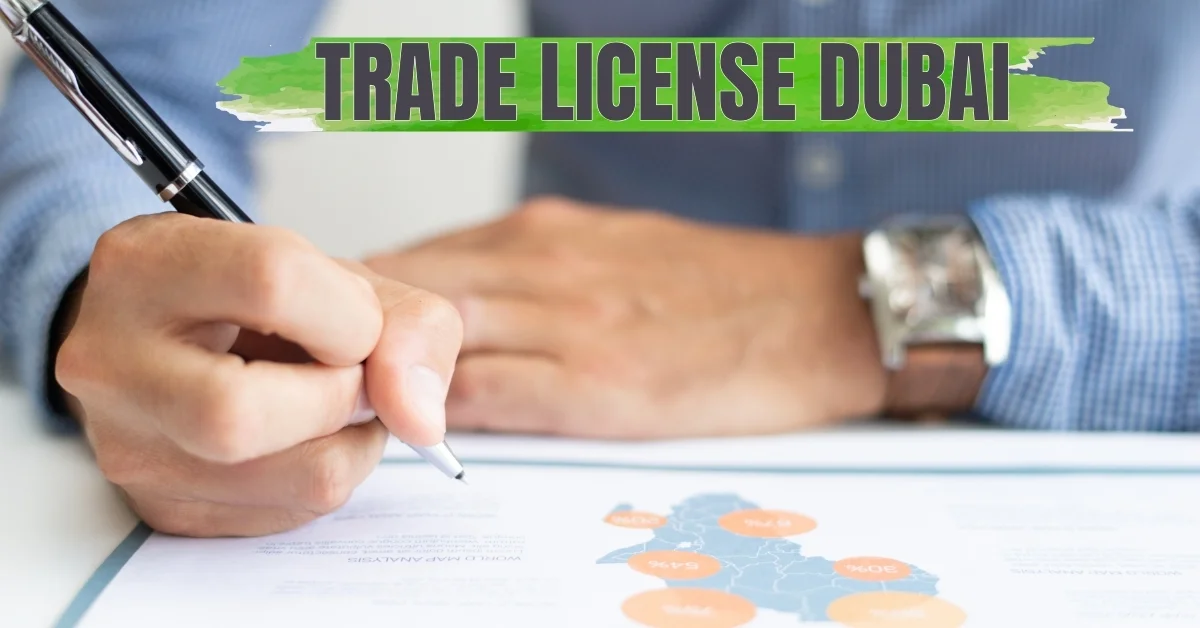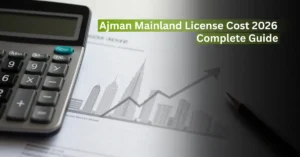1. Introduction to Trade License Dubai
Starting a business in Dubai is exciting, but before you begin operations, you must have the right trade license. A trade license in Dubai is the official document that allows you to run your business legally in the UAE. Without it, you cannot carry out any commercial activity.
Dubai’s government has made the licensing process clear and straightforward, but it still requires careful planning. The license type you choose affects your permitted activities, costs, and even your ability to trade internationally.
What is a Trade License in Dubai?
A trade license is a legal document issued by Dubai’s Department of Economy and Tourism (DET), previously known as the Department of Economic Development (DED). It defines:
- The business activities you can conduct
- Where you can operate (mainland, free zone, offshore)
- Your legal compliance with UAE business laws
In simple terms, it’s your business’s passport to operate in Dubai.
Legal importance:
- Protects your business rights
- Ensures compliance with UAE commercial regulations
- Allows you to sponsor employees and dependents
1. Who needs a trade license?
Simply put, anyone who wants to start a business in Dubai. Whether you plan to open a retail shop, start a consultancy, run a manufacturing unit, or sell products online, you must have the correct trade license before you can begin operations.
Types of Trade Licenses in Dubai
Dubai offers several types of trade licenses, each tailored to specific business needs. Choosing the correct one is crucial because it directly affects the activities you can perform, where you can operate, and even your tax benefits. Let’s explore the main license categories in detail so you can decide which fits your business best.
1. Commercial License – For trading goods and services
A Commercial License is the go-to option for companies engaged in buying, selling, or distributing goods. Whether you plan to import electronics, run a retail shop in a busy Dubai mall, or manage a logistics network, this license allows you to operate legally within the UAE and beyond. Many import/export businesses prefer it because it supports both local and international trading, making it ideal for entrepreneurs aiming for a wide market reach.
2. Professional License – For service-based businesses
If you offer specialized skills or expertise, you’ll need a Professional License. This license covers service-oriented activities such as consultancy, marketing, design, and IT services. One of its biggest advantages is that in most cases, it allows 100% foreign ownership, giving professionals full control over their operations. It’s perfect for freelancers, agencies, and specialized service providers who want to establish a credible presence in Dubai’s competitive market.
3. Industrial License – For manufacturing and industrial activities
Companies involved in manufacturing, processing, or assembling goods must apply for an Industrial License. This category includes businesses like furniture makers, food processing units, and factories. Because manufacturing impacts public safety and quality standards, this license usually requires additional approvals from relevant authorities. Having it ensures you meet all compliance requirements while running your industrial operations efficiently.
4. General Trading License – For multiple goods trading
If you want the freedom to trade in a wide range of goods without applying for separate licenses, a General Trading License is your best choice. It’s popular among large-scale import/export firms that deal with diverse products, from clothing and electronics to household goods. This license offers flexibility and scalability, which is essential for companies that plan to expand their product range over time.
5. E-Commerce License – For online businesses
With the rapid growth of online shopping, the E-Commerce License has become one of Dubai’s fastest-growing license types. It allows you to sell products or services online to both local and international customers. Whether you run a dropshipping store, a digital services platform, or an online boutique, this license ensures your business operates legally in the digital marketplace. It’s an excellent option for entrepreneurs looking to tap into Dubai’s tech-savvy consumer base.
Mainland, Free Zone, and Offshore Licenses
Where you register your business in Dubai plays a significant role in determining how you can trade, with whom you can trade, and the ownership rights you have. It also affects the taxes you pay and the benefits you enjoy. Let’s look at each option in detail so you can choose the one that best matches your goals.
1. Mainland License – Operate anywhere in UAE and internationally
A Mainland License is issued by Dubai’s Department of Economy and Tourism (DET). It gives you the freedom to do business anywhere in Dubai, across all seven Emirates, and even internationally. This is the best choice if you want to serve the local UAE market without restrictions. With a mainland license, you can open a physical store, bid for government contracts, and work with clients across different Emirates. It’s especially useful for companies that want both local and global reach.
2. Free Zone License – Benefits and restrictions
A Free Zone License is issued by one of Dubai’s many free zone authorities. The biggest advantage here is 100% foreign ownership, which means you can own your business entirely without needing a local partner. You also benefit from tax exemptions, simplified import and export procedures, and modern business facilities. However, there is one limitation: you can only operate within the free zone or trade internationally. To sell directly in the UAE mainland market, you’ll need to work with a local distributor or open a mainland branch.
3. Offshore License – For international business without a UAE office
An Offshore License is perfect if you want to run an international business but don’t need a physical office in the UAE. Many companies use it for holding assets, protecting wealth, or conducting global trading. While it offers full foreign ownership and no physical presence requirement, it does come with one key restriction: you cannot trade directly within the UAE’s local market. This option is popular among businesses that want to take advantage of Dubai’s tax-friendly environment for international operations.
Benefits of Getting a Trade License in Dubai
Dubai is one of the most business-friendly cities in the world, and having a valid trade license unlocks a range of advantages for entrepreneurs.
- 100% foreign ownership for eligible activities, giving you full control of your business.
- 0% personal income tax and competitive corporate tax rates, helping you keep more of your profits.
- Strategic global location, connecting East and West, making Dubai a major hub for international trade.
- Government support programs and incentives are designed to encourage startups and small businesses.
- Ability to sponsor employees and dependents, making it easier to grow your team and settle in the UAE.
- Access to a growing consumer market with strong demand for both products and services.
With the right license, you can position your business for long-term success while enjoying the benefits of Dubai’s dynamic economy and supportive business environment.
Step-by-Step Process to Get a Trade License in Dubai
The process is straightforward if you follow the correct steps.
| Choose a business location | Action | Details |
| 1 | Choose a business activity | Must be from the DET-approved list |
| 2 | Select a trade name | Follow UAE naming conventions |
| 3 | Apply to DET or the relevant Free Zone Authority | Mainland, Free Zone, or Offshore |
| 4 | Submit application | Pay fees and collect licenses |
| 5 | Get approvals | Industry-specific permits may be needed |
| 6 | Pay fees and collect license | Usually issued within a few days |
Documents Required for Trade License Dubai
To make sure your trade license application goes smoothly, it’s important to have all the required documents ready before you apply. Missing paperwork can delay approval and sometimes even lead to rejection. Here’s what you typically need:
- Passport copies of all shareholders: Every shareholder in the company must provide a clear, valid copy of their passport. This is required for identity verification.
- Visa copies (if applicable): If you already have a UAE residence visa, you’ll need to submit a copy along with your application. For foreign investors outside the UAE, this step is not always needed at the start.
- No Objection Certificate (NOC) from employer: If you are employed in the UAE and plan to start your own business, your current employer may need to provide a written NOC allowing you to engage in business activities.
- Tenancy contract or EJARI certificate for your office space: In Dubai, you must have a registered business address. Your tenancy contract should be attested through the EJARI system to prove that you have a legal workspace.
- Completed license application form: This is the official form from the Department of Economy and Tourism (DET) or the relevant free zone authority. Make sure all details are accurate to avoid processing delays.
By preparing these documents in advance, you save time and ensure your application moves quickly through the approval process.
Cost of a Trade License in Dubai
The cost of getting a trade license in Dubai is not the same for every business—it depends on several factors, such as the type of license, your chosen location, and the business activities you plan to conduct. Some setups can be relatively affordable, while others require a higher investment, especially if they involve specialized industries or larger operations.
1. Key factors that affect the cost
- Type of business activity: Businesses involved in manufacturing, healthcare, finance, or other regulated sectors often require additional approvals, which can increase costs.
- Number of visas required: If you plan to hire multiple employees or sponsor business partners, each visa adds to the total expenses.
- Business location: Setting up in a high-demand area on the mainland may involve higher rental and registration costs compared to certain free zones that offer more budget-friendly packages.
- Additional government approvals: Certain business types need extra permits from specific authorities, and these come with separate fees.
By evaluating these factors in advance, you can estimate your expenses more accurately and choose the most cost-effective setup for your needs. This approach also helps you avoid unexpected charges during the licensing process.
Timeframe to Get a Trade License in Dubai
The time it takes to receive your trade license in Dubai depends on where and how you register your business. In most cases, the process is quick compared to many other countries, but it still varies based on approvals, documentation, and the type of license you apply for.
- Mainland license: Generally issued within 5 to 7 working days, provided all your documents are complete and approvals are in place.
- Free zone license: Can be processed even faster, often within 3 to 5 working days, since free zones have more streamlined procedures.
- Offshore license: Usually takes between 5 to 10 working days because of additional compliance checks.
For entrepreneurs who need to start operations urgently, certain free zones offer fast-track services where licenses can be issued within just 24 hours. However, these options may come with higher fees.
How to Renew a Trade License in Dubai
A trade license in Dubai is typically valid for one year and must be renewed on time to keep your business legal and avoid fines. Renewal is straightforward but requires careful attention to details.
1. Renewal Requirements
To successfully renew your license, you must have:
- A valid tenancy contract (Ejari) with at least one month left before expiry
- Updated passport and visa copies for all owners and partners
- Payment for the applicable renewal fees
2. Step-by-Step Renewal Process
- Check your expiry date: Mark it on your calendar well in advance.
- Gather updated documents: Ensure your tenancy contract, passport copies, and visas are current.
- Apply for renewal: Submit your application through the DET (for mainland) or your respective free zone portal.
- Pay the renewal fees: Complete payment to avoid delays.
- Receive your renewed license: Once processed, you can continue operations without interruption.
Avoiding Fines and Penalties
Dubai has strict rules for business license compliance. If you miss your renewal date, you may face daily penalties, restrictions on transactions, and even suspension of your business activities. To avoid this:
- Always renew before expiry
- Keep tenancy contracts updated in the Ejari system
- Settle any outstanding fines before submitting your renewal
Common Mistakes to Avoid When Applying
Many first-time business owners make errors that delay or complicate their license approval. The most common ones include:
- Choosing the wrong license type: This can restrict your activities and require costly changes later.
- Not listing all planned activities: Adding activities after approval involves extra paperwork and fees.
- Submitting incomplete documents: Even small mistakes in names, signatures, or attachments can lead to rejections.
- Overlooking visa and sponsorship requirements: Especially important if you plan to hire staff.
- Missing renewal deadlines: This can lead to penalties and even license cancellation.
By understanding these timelines, requirements, and potential pitfalls, you can ensure a smoother trade license process in Dubai and keep your business running without unnecessary delays or fines.
FAQs
1. Do I need a trade license to sell online in UAE?
Yes, even online sellers need an e-commerce license.
2. Can a foreigner own 100% of a company in Dubai?
Yes, in most free zones and for specific mainland activities.
3. Which is the cheapest trade license in Dubai?
Some free zones offer licenses starting from AED 5,750, depending on activity and visa needs.
4. Is a trade license valid across all Emirates?
No, mainland licenses are valid across UAE, but free zone licenses are restricted unless you use a distributor.
Conclusion
Getting a trade license in Dubai is your first step toward running a successful business in the UAE. By choosing the right license type, preparing your documents carefully, and following the proper steps, you can start operating in just a few days.
Dubai’s business-friendly environment, tax advantages, and strategic location make it one of the best places in the world to start a company. Take the time to plan your setup, and you’ll enjoy smooth operations and strong growth opportunities.






